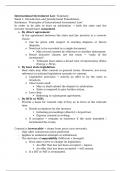Samenvatting
summary ALL READINGS INTERNATIONAL INVESTMENT LAW
Summary of ALL READINGS INTERNATIONAL INVESTMENT LAW, this includes the book and the articles prescribed. International Investment Law is a course taught at the University of Amsterdam (UvA) as part of the masters (LL.M.) International Trade and Investment Law. Written bij an honours studen...
[Meer zien]




